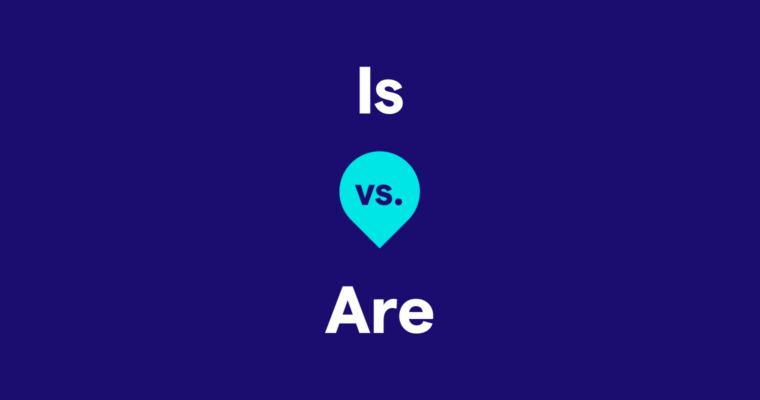
- The words is and are are both conjugations of the verb to be, which shows existence, condition, state, or identity.
- The difference between is and are depends on the subject; is goes with singular third-person subjects, and are goes with everything else.
- Collective nouns describe a group, but the word itself can be treated as singular. In American English, collective nouns typically use is.
- Mass nouns represent something difficult to count, like water or sand, and use is.
- Subjects with the phrase “a number of …” use are, while those with “a group of …” or “a pair of …” use is.
The verb to be is the most common verb in English, but unfortunately, it’s also one of the most confusing. The verb to be has different conjugations depending on the subject and the verb tense. Is and are are the most common conjugations, but how do you know which one to use when?
Table of contents
Is or are with collective nouns
Is or are with collecting phrases
Is or are? Which is correct?
The words is and are are both conjugations of the verb to be, which shows existence, condition, state, or identity. However, is and are are just two of many different conjugations of be. The correct conjugation to use depends on the verb tense, as with all verbs, and also the subject of a sentence.
The words is and are are both used in the simple present tense. If you want to use the verb to be in the simple past tense, you have to use was and were instead.
To use to be in the present tense, you have to first decide which is correct, is or are. The right choice depends on the subject for two reasons.
- It has to match subject-verb agreement: If the subject is singular, the verb must also be singular; if the subject is plural, the verb must also be plural.
- It has to match the first, second, and third person. The first person is speaking about the speaker (I), the second person is speaking about the listener (you), and the third person is speaking about other things (he, she, it).
Use is if the subject is third person and singular but use are if the subject is almost anything else. The only exception is if the subject is first person and singular, which uses am, another form of be. This may make it seem like are is used more often, but remember that many sentences are about subjects that aren’t the speaker or listener, so the third person is very common for subjects.
When to use is vs. are
Singular vs. plural subjects
If the subject is in the third person, you need to determine whether it’s singular or plural before you can choose is vs. are. Subjects are always nouns, so you just need to review the rules for singular nouns and plural nouns.
- Singular: The English language is frustrating.
- Plural: Many languages are frustrating.
In these examples, “the English language” is singular because it refers to only one language. However, “many languages” refers to more than one language, so it is plural.
Often, plural nouns end in an s, but their singular forms do not.
However, be careful because some singular nouns end in s, too.
This rule also applies to personal pronouns.
Don’t forget that verbs can also be used as nouns if they form a gerund (swimming) or infinitive (to swim). In these forms they can be used as subjects, but they are always singular.
Forming questions with is vs. are
Questions follow the same rules for is and are as other sentences do. However, in English the order of the words is a little different for questions, so you may need to look for the subject.
Also remember that the verb comes first in yes-or-no questions, so you might place is or are at the beginning of the sentence.
How to use is and are with either/or and neither/nor
The phrases either/or and neither/nor can make it difficult to decide between is or are. When either/or and neither/nor act as adjectives, they come before a pair of nouns. The number and person of those nouns determines whether is or are is correct.
If both nouns are singular, use is.
If both nouns are plural, use are.
If one noun is singular and the other is plural, use are and place the plural noun last, next to the verb.
If the nouns are different persons, match is or are with the last one in the pair.
How to use is and are with compound subjects
Compound subjects describe when a sentence has two or more subjects connected by and or or. These subjects can be either singular or plural, so you have to check the usage before deciding between is and are.
If a compound subject uses and, it is usually plural and uses are. This is because the two subjects are counted together as a multiple, even if the individual subjects are singular nouns.
However, there are some exceptions. If the nouns of the subject are modified by the words each or every, then they are considered singular and use is.
If two nouns are joined by and but act as a single unit, they aren’t considered a compound subject. In this case, use is.
If a compound subject uses or, it follows the same rules above for either/or and neither/nor. If both nouns are singular, use is.
If both nouns are plural, use are.
If one noun is singular and another is plural, match the last noun in the series.
How to use is and are with indefinite pronouns
If the subject is an indefinite pronoun like everyone, all, or something, it can be hard to determine whether it’s singular or plural. Some indefinite pronouns are always singular, and some are always plural, so you just have to learn the difference to decide between is and are.
To make things more complicated, some indefinite pronouns can be both at different times. For these, you have to determine whether they’re singular or plural based on the context.
Below, we provide lists to show which indefinite pronouns are singular, plural, or both.
Singular indefinite pronouns (use is)
- another
- anybody
- anyone
- anything
- each
- either
- enough
- everybody
- everyone
- everything
- less
- little
- much
- neither
- nobody
- no one
- nothing
- one (meaning “everyone”)
- other
- somebody
- someone
- something
- you (meaning “everyone”)
Plural indefinite pronouns (use are)
- both
- few
- fewer
- many
- others
- several
- they (abstract, like “they say …”)
Indefinite pronouns that can be both (is or are depends on context)
- all
- any
- more
- most
- none
- some
- such
Is or are with collective nouns
A collective noun refers to a group of people or things that is treated as a single entity in speech. Committee is a collective noun. A committee is made up of multiple people, but the word itself is singular in form. In American English, collective nouns take is. In British English, collective nouns can take is or are.
But even in American English, a collective noun can take are when the writer’s intention is to emphasize the individual members of the group.
Is or are with mass nouns
Mass nouns (also called noncount nouns) are similar to collective nouns. They refer to things that can’t really be counted. Sand and water are mass nouns. Mass nouns take is in both American and British English.
Is or are with collecting phrases
Collecting phrases—like “a number of … ,” “a group of … ,” or “a pair of… “—can make it hard to choose between is and are. Phrases like this can trick you into thinking singular subjects are plural or make you question whether some nouns are really plural. Let’s take a look at each one individually.
Use are with “a number of …”
Which verb do you use when you’re talking about “a number of” something? On the one hand, number is singular, which calls for is, but if the noun is plural, does that mean you should use are?
Typically, it’s best to use are with “a number of …”; essentially, the phrase is an idiom that means the same thing as several, which would make the subject plural, which means it uses are.
Keep in mind that the phrase “the number of …” is different from “a number of … .” If the phrase uses “the number” instead of “a number,” then it is always singular because the subject is the singular noun number.
Use is with “a group of …”
Other collecting phrases, like “group of …” or “series of … ,” can take is when you’re emphasizing the group as a single entity:
But they can also take are when you’re emphasizing the individuals:
Use is with “a pair of …”
When you’re talking about pairs, you’re usually treating two items as a unit, so it’s common to use is:
“There is” vs. “there are”
When choosing between there is and there are, you have to look at what comes after the phrase:
In the sentence above, cat is the subject, and since it is singular, it requires there is.
In the sentence above, opportunities is the subject, and since it is plural, it requires there are. (Don’t let the word many throw you off—concentrate on the noun.)
Is and are can be confusing, but they are also some of the most common words used in English. Just remember that, in the present tense, plural subjects always use are and singular subjects usually use is (except for first-person subjects like I and second-person subjects like you). There are some sentences that are more difficult than others, but review the rules above, and you’ll always know the right choice.
Is vs. are FAQs
How do I know when to use is vs. are?
Using is or are depends on the subject’s person and number. Basically, subjects that are singular and third person use is, but everything else uses are (except for the first-person pronoun I, which uses am). Is and are are the present tense forms of to be, but if you want to use the past or other tenses, you might have to use other conjugations.
What’s the difference between “there is” and “there are”?
Sentences that start with “there is” or “there are” don’t follow the usual grammar rules because the subject comes after the verb. You still have to choose is or are based on the subject’s person and number, but you may have to think about which word is the subject.
Do I use is or are with phrases like “a number of …” or “a group of …”?
Collecting phrases, like those that start with “a number of,” “a group of,” “or a pair of,” can make it hard to choose between is and are. As a quick guide, subjects that use the phrase “a number of” use are, while those with “a group of” or “a pair of” use is.






